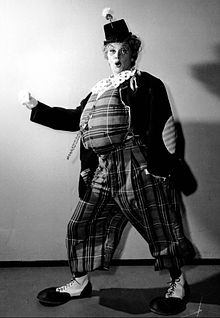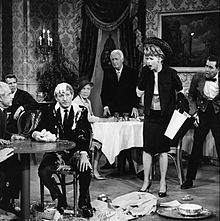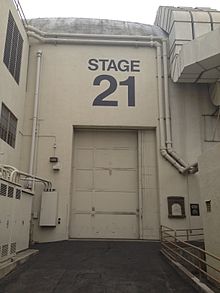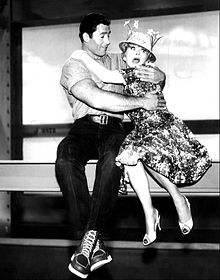The Lucy Show
In 1960, Lucille Ball and Desi Arnaz divorced, and the final episode of The Lucy–Desi Comedy Hour aired (using the I Love Lucy format).
After a two-year run, the comedy series Pete and Gladys (which was a spin-off of the popular Desilu sitcom December Bride), was canceled in the spring of 1962.
At that time, the red-headed Williams, who had been promoted as the next Lucille Ball, had just received an Emmy nomination as Best Actress in a Comedy Series for her role on the show.
Lucy moves to Los Angeles to be closer to Chris, who was attending college in California (but no longer appeared on the show), and enrolls Jerry in a military boarding school there (facilitating his also being written out).
The show began with Lucille Ball as Lucy Carmichael, a widow with two children, Chris (Candy Moore) and Jerry (Jimmy Garrett), living in the fictional town of Danfield, New York, sharing her home with divorced friend Vivian Bagley (Vance) and her son, Sherman (Ralph Hart).
In order to get Vance to commit to the series, Arnaz acquiesced to her demands for an increase in salary, co-star billing, a more attractive wardrobe and, finally, that her character's name be Vivian.
][better source needed] Although the book on which the show was based, Irene Kampen's Life Without George, centered on two divorcées living together in the same house raising their children, it was decided early on that the Lucy Carmichael character should instead be a widow.
[3] In the show's original format, Lucy had been left with a substantial trust fund by her late husband, which was managed during the first season by local banker Mr. Barnsdahl (Charles Lane).
Comedian Dick Martin, working solo from his longtime partner Dan Rowan, was cast in ten episodes as Lucy's next-door neighbor and frequent boyfriend, Harry Connors, during the show's first season.
The Barnsdahl character was replaced by Theodore J. Mooney, played by Gale Gordon, who would remain with the series for the remainder of its run, surviving another format change.
The name "Theodore Mooney" had been used earlier by the actor George Cisar, who was cast as a police sergeant on thirty-one episodes of Gordon's other CBS sitcom, Dennis the Menace.
Six years later, Gordon became a regular on the short-lived NBC-TV sitcom Sally which starred actress Joan Caulfield (who inherited Lucille Ball's role as Liz Cooper when My Favorite Husband was directly adapted to television in 1953).
Gordon was to have joined The Lucy Show at its premiere in the fall of 1962, but he was still contractually obligated to Dennis the Menace, in which he had replaced Joseph Kearns, who had unexpectedly died earlier in the year.
It was later revealed that Ball had grown unhappy with Charles Lane because of his difficulty remembering his lines in front of the studio audience and was eager to have Gordon join the cast.
During the first two seasons, a few guest stars were brought in for some episodes such as Broadway superstar Ethel Merman, actor-comedian Wally Cox, singer Roberta Sherwood, and golf pros Jimmy Demaret and Bo Wininger.
At this time, Ball also used many other well-known character actors in featured parts such as Carole Cook, Mary Wickes, Roscoe Karns, John McGiver, William Schallert, John Carradine, Robert Alda, Majel Barrett, Karen Norris, Dorothy Konrad, Lou Krugman, Stafford Repp, Ellen Corby, Philip Carey, Carl Benton Reid, Lyle Talbot, Leon Ames, Jackie Coogan, Kathleen Freeman, Keith Andes (who was Ball's leading man in the Broadway musical Wildcat), William Windom, Vito Scotti.
Robert Rockwell, Frank Aletter, Reta Shaw, Murvyn Vye, Hazel Pierce, J. Pat O'Malley, Roland Winters, Sandra Gould, Cesare Danova, Bobs Watson, Nancy Kulp, future Academy Award-winning actor Jack Albertson, and even the "Queen of the Hollywood Extras" Bess Flowers.
[7] In early 1964, the show was in threat of getting canceled when Lucille Ball attempted to retire from CBS to spend her time as president of Desilu Productions,[8] but she changed her mind and signed a new three-year agreement with the network.
With the absence of Carroll, Martin, Weiskopf, and Schiller, Ball hired veteran comedy writer Milt Josefsberg, who had written for Jack Benny, as script consultant.
Vivian Vance reduced the number of episodes in which she appeared in that season to spend more time on the East Coast with her husband, literary editor John Dodds.
Ann Sothern, whom Ball considered to be "the best comedian in the business, bar none" and a personal friend,[10] made a number of appearances during 1964 and 1965 as the "Countess Framboise" (née Rosie Harrigan) to fill Vance's absence.
For example, in the episode "Lucy and the Old Mansion", which was the final Season 3 installment, filmed in January 1965, Moore, Garrett, and Hart appear in the opening scene, have a few lines of dialogue, then exit.
Because Moore was popular with teenagers and the subject of dozens of articles in youth-oriented magazines at the time, her departure was originally nixed by CBS but finally accepted when Ball threatened to "retire."
It was explained that Vance's character (Vivian Bagley) remarried and that she, along with her son Sherman and her new husband, remained in Danfield, although she returned for a few guest appearances towards the end of the series' run.
[13] With Candy Moore and Ralph Hart having already left the show at this point, only Jimmy Garrett was retained, but he would make only two appearances to support the transition before he, too, was phased out of the series.
During the filming of that particular show, Ball was constantly being corrected by her crew saying that the son's name was Jerry and that Jimmy Garrett had played that part and that was the reason for her being confused.
For the 1966–67 season, Gale Gordon was nominated for an Emmy Award as Best Supporting Actor in a Comedy Series, but lost to Don Knotts, who won for his guest appearance in the episode "The Return of Barney Fife" on The Andy Griffith Show.
These included Jack Benny, Mickey Rooney, Carol Burnett, George Burns, Joan Crawford, Tennessee Ernie Ford, Dean Martin, Phil Silvers, Frankie Avalon, Wayne Newton, Robert Stack, Mel Tormé, John Vivyan, Jack Cassidy, Clint Walker, and Milton Berle.
[citation needed] Ball was said to have requested several times to replace Crawford with Gloria Swanson, who was supposed to have filled the role originally but bowed out for health reasons.
In an interview with Jimmy Garrett, he said the audience barely laughed at rehearsals, and Desi Arnaz cancelled the episode with Lucille Ball's permission.








